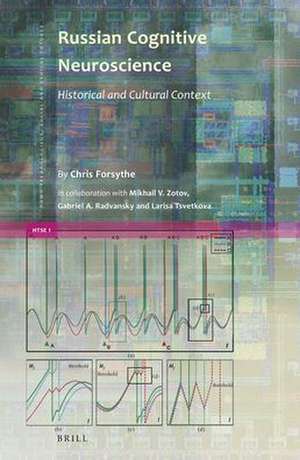Russian Cognitive Neuroscience: Historical and Cultural Context: Homo Technologicus, Social and Ethical Futures, cartea 1
Editat de Chris Forsytheen Limba Engleză Hardback – 12 ian 2022
Preț: 1000.99 lei
Preț vechi: 1220.72 lei
-18% Nou
Puncte Express: 1501
Preț estimativ în valută:
191.60€ • 208.19$ • 161.05£
191.60€ • 208.19$ • 161.05£
Carte indisponibilă temporar
Doresc să fiu notificat când acest titlu va fi disponibil:
Se trimite...
Preluare comenzi: 021 569.72.76
Specificații
ISBN-13: 9789004505643
ISBN-10: 9004505644
Dimensiuni: 155 x 235 mm
Greutate: 0 kg
Editura: Brill
Colecția Brill
Seria Homo Technologicus, Social and Ethical Futures
ISBN-10: 9004505644
Dimensiuni: 155 x 235 mm
Greutate: 0 kg
Editura: Brill
Colecția Brill
Seria Homo Technologicus, Social and Ethical Futures
Cuprins
Contents
Notes on Contributors IX
Acknowledgements XI
1 Origins of Russian Cognitive Psychophysiology
L. V. Sokolova
2 The Beginnings of Russian Cognitive Psychophysiology
V. I. Shostak
3 Systemic Psychophysiology
Yuri I. Alexandrov
4 Cognitive Activity from the Perspective of Functional Systems Theory
K. V. Sudakov
Section 1 Commentary: The Genesis and Development of Russian Experimental Neuroscience
Gabriel A. Radvansky and Chris Forsythe
5 The Regulatory Role of an Unconscious Cognitive Set in the Perception of the Facial Expression of Emotion
Eduard Arutunovich Kostandov
6 “Human–Neuron–Model”: A Spherical Model of Signal Discrimination in the Visual System
C. A. Izmailov, A. M. Chernorizov, and V. B. Polyansky
7 Individual Characteristics of Brain Activity and Thinking Strategies
Olga M. Razumnikova and Nina V. Volf
Section 2 Commentary: Neuroscience of Cognitive Skills and Abilities
Gabriel A. Radvansky and Chris Forsythe
8 Brain Oscillations and Personality from an Evolutionary Perspective
Gennady G. Knyazev
9 Oscillatory Dynamics of Spiking Neurons and the Modeling of Memory Functions
V. I. Nekorkin and V. B. Kazantsev
10 Frequency-Selective Generators of Oscillatory Brain Activity as Mapping Structure and Dynamics of Cognitive Processes
N. N. Danilova
11 Oscillatory Self-Organization of Cyclic Synthesis of Sensory Information and Memory Content for Object Recognition
Sergey A. Miroshnikov, Margarita G. Filippova, and Roman V. Chernov
Section 3 Commentary: Models of Neural Dynamics Provide a Foundation for Neurocognitive Interventions
Chris Forsythe and Gabriel A. Radvansky
12 Individual Alpha Activity Indices and Biofeedback
Olga Mikhailovna Bazanova
13 The Psychophysiology of Combat Activity
A. A. Bochenkov
14 The Use of Fuzzy Logic and Artificial Neural Networks to Predict the Professional Fitness of Operators of Technical Systems
A. P. Bulka
Section 4 Commentary: Neuroscience Applications Extending from the Clinical to the Professional to Everyday Domains
Chris Forsythe and Gabriel A. Radvansky
Index
Notes on Contributors IX
Acknowledgements XI
section 1: History and Tradition of Russian Neuroscience
1 Origins of Russian Cognitive Psychophysiology
L. V. Sokolova
2 The Beginnings of Russian Cognitive Psychophysiology
V. I. Shostak
3 Systemic Psychophysiology
Yuri I. Alexandrov
4 Cognitive Activity from the Perspective of Functional Systems Theory
K. V. Sudakov
Section 1 Commentary: The Genesis and Development of Russian Experimental Neuroscience
Gabriel A. Radvansky and Chris Forsythe
section 2: Russian Research in Perceptual and Cognitive Processes
5 The Regulatory Role of an Unconscious Cognitive Set in the Perception of the Facial Expression of Emotion
Eduard Arutunovich Kostandov
6 “Human–Neuron–Model”: A Spherical Model of Signal Discrimination in the Visual System
C. A. Izmailov, A. M. Chernorizov, and V. B. Polyansky
7 Individual Characteristics of Brain Activity and Thinking Strategies
Olga M. Razumnikova and Nina V. Volf
Section 2 Commentary: Neuroscience of Cognitive Skills and Abilities
Gabriel A. Radvansky and Chris Forsythe
section 3: Russian Electrophysiological Research
8 Brain Oscillations and Personality from an Evolutionary Perspective
Gennady G. Knyazev
9 Oscillatory Dynamics of Spiking Neurons and the Modeling of Memory Functions
V. I. Nekorkin and V. B. Kazantsev
10 Frequency-Selective Generators of Oscillatory Brain Activity as Mapping Structure and Dynamics of Cognitive Processes
N. N. Danilova
11 Oscillatory Self-Organization of Cyclic Synthesis of Sensory Information and Memory Content for Object Recognition
Sergey A. Miroshnikov, Margarita G. Filippova, and Roman V. Chernov
Section 3 Commentary: Models of Neural Dynamics Provide a Foundation for Neurocognitive Interventions
Chris Forsythe and Gabriel A. Radvansky
section 4: Russian Translational Neuroscience Research
12 Individual Alpha Activity Indices and Biofeedback
Olga Mikhailovna Bazanova
13 The Psychophysiology of Combat Activity
A. A. Bochenkov
14 The Use of Fuzzy Logic and Artificial Neural Networks to Predict the Professional Fitness of Operators of Technical Systems
A. P. Bulka
Section 4 Commentary: Neuroscience Applications Extending from the Clinical to the Professional to Everyday Domains
Chris Forsythe and Gabriel A. Radvansky
Index
Notă biografică
Chris Forsythe has worked as a distinguished researcher for many years at Sandia National Laboratories in Albuquerque, New Mexico, applying brain science for technological improvements to human performance. He earned his PhD in Experimental Psychology and MS in Biopsychology from the University of Memphis.
